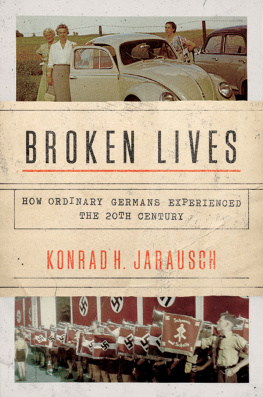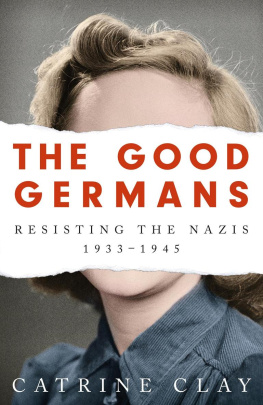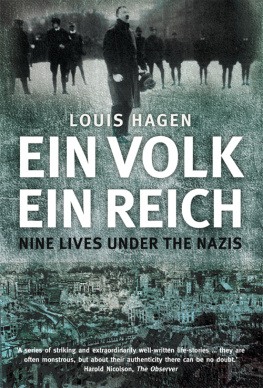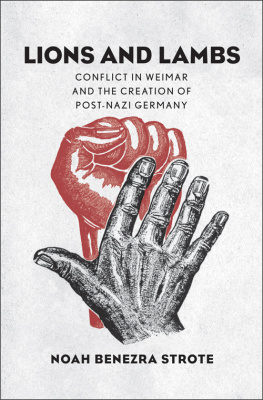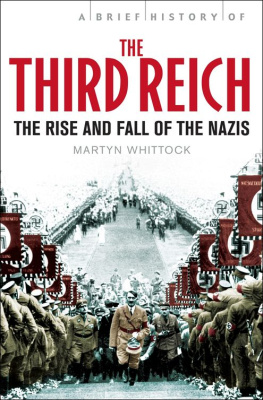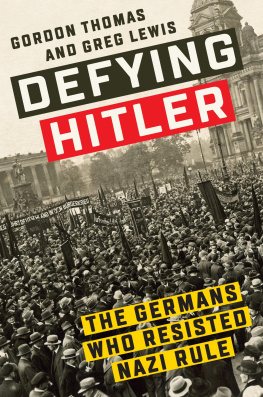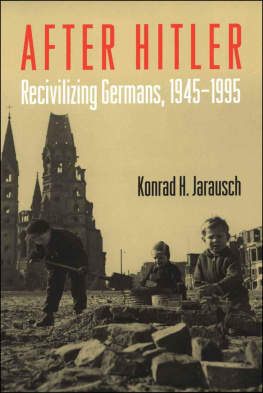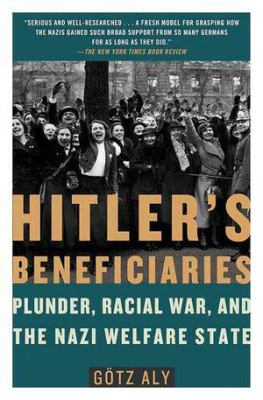BROKEN LIVES
BROKEN LIVES
How Ordinary Germans Experienced the Twentieth Century
KONRAD H. JARAUSCH
Princeton University Press
Princeton and Oxford
Copyright 2018 by Princeton University Press
Published by Princeton University Press,
41 William Street, Princeton, New Jersey 08540
In the United Kingdom: Princeton University Press,
6 Oxford Street, Woodstock, Oxfordshire OX20 1TR
press.princeton.edu
Jacket photographs: (top) Courtesy of the Prussian Heritage Image Archive, Berlin;
(bottom) Courtesy of Isolde Stark
All Rights Reserved
ISBN 978-0-691-17458-7
Library of Congress Control Number: 2018932868
British Library Cataloging-in-Publication Data is available
This book has been composed in Minion Pro
Printed on acid-free paper.
Printed in the United States of America
1 3 5 7 9 10 8 6 4 2
Contents
Cast of Characters
1. Key Individuals (more than eighty mentions)
Angress, Werner Tom, *1920 in Berlin into a wealthy Jewish family, expelled from high school, learned farming at Gross Breesen, escaped from Germany in 1938, worked at Hyde Farmlands in Virginia, joined US military intelligence, parachuted into Normandy, went to college on GI bill, became German historian, retired to Berlin.
Baehrenburg, Ursula (name changed on request of author), *1927 in Pomerania into bakers family, was raped by Red Army soldiers, expelled to West Germany, studied education, worked in various schools as special education teacher outside Frankfurt, had difficulty with personal relationships, retired to live with childhood friend.
Bulwin, Ruth, *1922 in Kassel, father an abusive traveling salesman, enthusiastic BdM member, married a Hitler Youth leader and SS soldier during the war, lived in occupied Prague, fled from East to West Germany, worked in government office, helped husband build a house and create an independent business firm.
Fest, Joachim, *1926 in Berlin, father a conservative Catholic high-school teacher critical of the Third Reich, avoided the Hitler Youth, volunteered for the German military in 1944, released from US captivity, studied law and art history, worked for Radio in the American Sector, became a noted journalist and historian.
Frenzel, Paul, *1920 in Leipzig into lower-middle-class family, served in construction battalion in Wehrmacht, fled dramatically from Russian imprisonment, learned accounting, joined SPD, worked as banker and financial expert, had conflict with SED, became critic of planned economy, was Stasi target, as retiree was allowed to move to FRG.
Grothus, Horst, *1925 in Essen, stepfather successful lawyer, member of air Hitler Youth, enthusiastic supporter of Third Reich, captured at end of war, lost both feet in Russian POW camp, served as manager in uncles firm, became independent management consultant, turned into a liberal democrat, pacifist, and social activist.
Hrtel, Karl, *1923 in Breslau into working-class family, served in Wehrmacht, escaped from French prison camp, trained as electrician and mechanic, studied engineering in night school, worked in chemical triangle of GDR, fled to West Germany before the building of the Wall, began new career in FRG nuclear facility.
Helmer, Erich, *1922 in Braunschweig, father a critical Protestant pastor and opponent of Third Reich, avoided Hitler Youth, served in air force, escaped imprisonment, lived in East but completed Gymnasium in the West, studied theology, had run-ins with nationalist church hierarchy, became a critical clergyman and left the official church.
Joachim, Gerhard, *1926 in Stettin into half-Jewish business family, joined air force, tried to desert, was imprisoned, succeeded in reaching Russian lines, turned into a socialist idealist, became cultural functionary, ran afoul of party line, was disciplined, lost son to suicide in the West, hoped for Gorbachev, was disappointed in unification.
Johannsen, Horst, *1929 in Barmbek, father unskilled worker, Communist, as child sent to Transylvania, drafted at end of war, left unit and went home, slave laborer for SED, musical entertainer, studied engineering, worked as shipping clerk at railroad and dispatcher for chemical combine, critic of planned economy in GDR.
Klein, Fritz, *1924 in Berlin into upper-class nationalist publishing family, stepfather educator, served in military without enthusiasm, converted to Communism, studied Marxist history, served as editor of professional journal, was disciplined and sent to Academy of Sciences, became prominent GDR historian and Gorbachev supporter.
Krapf, Gerhard, *1924 in Meissenheim, father charismatic Protestant clergyman, patriotic youth, served as artillery officer in Wehrmacht, was imprisoned by Russians for several years, studied music at Karlsruhe, became organist and composer, due to exchange year emigrated to US, became University of Iowa professor.
Mahlendorf, Ursula, *1929 in Strehlen into middle-class family, supported the war, was caught in Silesia in the final fighting, expelled by the Poles, finished high school in the West, studied languages and enjoyed exchange year in US, emigrated there and became professor of German studies, fierce critic of National Socialism.
Neumaier, Robert, *1924 in Lahr into binational Swiss-German trading family, Catholic milieu, apprenticed as metal worker, air force volunteer, survivor of Stalingrad and Normandy, studied engineering after the war, specialized in circular-pump design, wrote several books and became international authority in his field.
Raschdorff, Hellmut, *1922 in Kassel into Catholic merchant family, skeptical of the Third Reich, apprenticed in business, volunteered for army, was wounded, sent to Channel Islands, started own textile business selling door to door, succeeded through hard labor typical of Economic Miracle, enjoyed car, house, mountain hikes, and travel.
Schffski, Edith, *1928 in Berlin into sectarian Protestant family, poor household, limited schooling, cared for younger sister, worked as telephone operator, experienced saturation bombing, survived Russian occupation and postwar hunger and cold, met refugee husband, started her own family in spite of dire need.
Schultheis, Heinz, *1921 in Giessen, father wealthy store-owner, Hitler Youth member, drafted into Labor Service, construction soldier, survived combat, studied chemistry, worked as university research assistant, joined leading chemical company BSAF and had a successful business career.
2. Secondary Protagonists (more than forty mentions)
Andre, Horst, *1927 in Pomerania, father forester, Wehrmacht service in Italy, POW, flight from East to West Germany, trained in forestry, forester in Rhineland-Palatinate.
Baucke, Gerhard, *1919 in Berlin, father baker and Nazi, Wehrmacht survivor, GDR journalist, West Berlin anti-Communist, successful printing company owner.
Debus, Hermann, *1926 in Buer, patriotic Navy SEAL, Rhine River captain, chemical shift worker, local real-estate official, disability retiree, amateur theater actor.
Eyck, Frank, *1920 in Berlin, father prominent Jewish lawyer and politician, sent to UK boarding school, served in British occupation force, European historian in Canada.
Feigel, Werner, *1924 in Plauen, military truck driver, East German police officer, despite problems with SED an unregenerate Communist, spokesman for ex-GDR elite.
Finckh, Renate, *1926 in Ulm, League of German Girls leader, study of German and history, mother of eight children, youth author, moved to southern France.
Gay, Peter, *1923 in Berlin as Peter Frhlich into an assimilated Jewish family, escaped Nazi Germany 1939 via Cuba, arrived in the US 1941, distinguished historian.
Gompertz, Albert, *1921 in Gelsenkirchen, father wealthy Jewish furrier, migr to US, served in the US Army, US citizen, successful businessman.
Next page
